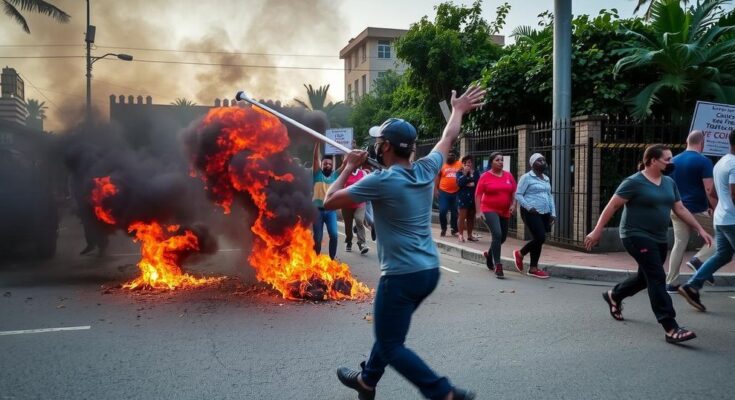Political unrest in Mozambique has led to over 1,500 prisoners escaping from a Maputo facility amidst protests following disputed election results. Clashes have resulted in 33 deaths, and looting has engulfed the capital. The situation escalated after the Frelimo party retained power due to a contested electoral outcome, igniting widespread dissent led by opposition leaders who have fled into exile after calling for protests.
In Mozambique, over 1,500 prisoners took advantage of political turmoil, escaping from a prison in Maputo amidst protests following controversial election results. The unrest has claimed at least 33 lives and injured 15 others during confrontations with guards, according to police chief Bernardino Rafael. Following the announcement that the ruling Frelimo party had secured victory in the October presidential elections, public dissent escalated, culminating in protests that directly impacted prison security.
The situation escalated dramatically when anti-government demonstrators gathered near the Maputo prison. Seizing the opportunity presented by the chaos, the inmates managed to breach a wall, facilitating their escape. Following these events, law enforcement reported the recapture of approximately 150 escapees. The violence stems from the recent confirmation by Mozambique’s highest court of the Frelimo party’s dominance, revised from an initial election result that indicated Daniel Chapo won 71% of votes to just 65%. This change has exacerbated tensions in a nation historically marred by political strife since Frelimo’s rise to power in 1975.
Since the announcement of the election results, Mozambique has faced widespread unrest, resulting in substantial civil disturbances characterized by looting and violence against state establishments. Many witnesses have described the capital, Maputo, as desolate, with businesses shuttered in an effort to safeguard against the unrest. The interior minister confirmed that around 21 individuals perished amidst these recent disturbances, marking this as one of the most significant bouts of violence the city has experienced in recent decades.
Opposition leader Venâncio Mondlane, who has reportedly fled the country, has publicly denounced the election results as fraudulent and called for further demonstrations. His social media communications hinted at the possibility of “a new popular uprising” if the court’s findings were not revisited. With approximately 150 fatalities reported over merely three months of protests, the implications of these events will undoubtedly resonate across the region and raise questions about Mozambique’s political stability going forward.
The political context in Mozambique has been tumultuous since the controversial presidential elections held in October. The ruling Frelimo party, which has been in power since 1975, faced allegations of electoral fraud from opposition factions. Following a constitutional court ruling affirming Frelimo’s victory but lowering the candidate’s percentage of votes, discontent surged, leading to widespread protests. The atmosphere of unrest intensified following violent clashes that resulted in significant casualties and mass prison breaks, reflecting deep-seated political grievances and a volatile security situation in the country.
In summary, the recent civil unrest in Mozambique is deeply intertwined with the political crisis stemming from disputed election results. Escalating protests have resulted in hundreds of prison escapes and significant loss of life. The consequences of this unrest underscore the fragility of the political environment in Mozambique, with the potential for ongoing violence as calls for justice and accountability from opposition leaders resonate within a disillusioned populace.
Original Source: www.bbc.com




